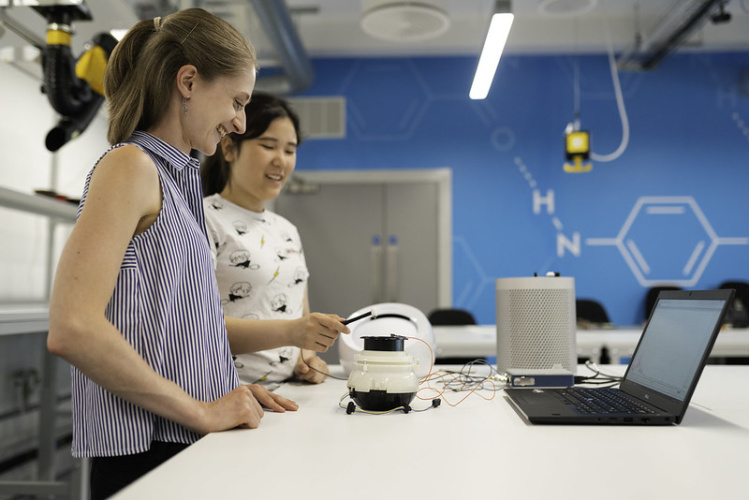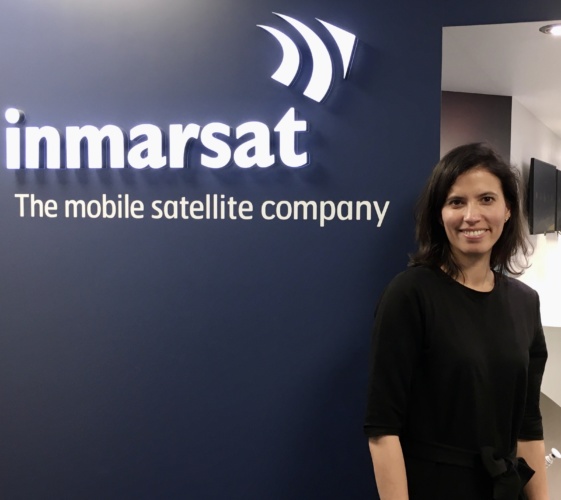 With a career spanning almost two decades, Edwina Paisley has designed and tested complex products from missiles to interplanetary spacecraft. She is currently director of Space Programmes at Inmarsat, and programme manager for the Inmarsat-6 (I-6) satellites, the most complex spacecraft the company has made to date. Working with a team with a 50 per cent gender split, inspiring the next generation of female leaders is part of her remit.
With a career spanning almost two decades, Edwina Paisley has designed and tested complex products from missiles to interplanetary spacecraft. She is currently director of Space Programmes at Inmarsat, and programme manager for the Inmarsat-6 (I-6) satellites, the most complex spacecraft the company has made to date. Working with a team with a 50 per cent gender split, inspiring the next generation of female leaders is part of her remit.
From an early age, I loved fixing things – fixing a toy, pretending the dog had a broken ankle. Initially, that concept around repairing things made me think I wanted to pursue something related to medicine. Then I realised the possibilities created by taking inanimate objects apart and putting them back together. Not only could I repair them; I could improve them or change their purpose. This is how I decided I wanted to work in engineering.
STEM gender imbalances
I did stand out amongst my peers as a girl wanting a career in STEM. In 2018 only 12 per cent of all engineers in the UK were female – that’s a large proportion of the population that will, in turn, have no influence on where science will go in the future.

There was a perception that science was “too difficult” or that it was a “boy thing”. It strikes me that a lot of these reasons are cultural. We know that before the age of seven you have no concept of the gender split and studies have shown that girls engage far more with the sciences in primary school than they do in secondary. It is clear education is key in addressing this issue.
I consider it my duty as a woman in a leadership role in a traditionally male-dominated industry to encourage future generations to pursue sciences by showing them what is possible. There are glaringly few well-known female role models in STEM- having these figures to look up to is vital to give girls the confidence that anyone can pursue and succeed in a STEM career.
From school to the stars
I studied computer science and maths before moving into aerospace. The great thing about the hard sciences is there’s no need to have the “perfect” degree to match the “perfect” job. A solid grounding is what’s important. For instance, after my studies I wanted to create and innovate so I began my career designing and testing missiles. Missiles don’t last very long though, which is why I decided to transition into space where projects have a longer lifespan.
I am very privileged to work in a field where I still experience that same child-like wonder that drove me into the sector. There’s nothing like seeing a project through from conception to the final product. It is a mindset shared by the brilliant peers I am lucky enough to work with.

Every project is intense and solving problems is very rewarding. Launching satellites is intrinsically very exciting and for me every launch is a career highlight. My current work on the I-6 will probably be the pinnacle as ultimately this development will support the 5G network and deliver faster and even more reliable maritime and aviation connectivity, particularly for safety-critical systems.
Addressing the imbalance
The space industry is doing a lot to champion women in traditionally male-dominated careers. The challenge is that it has been male-centric for so long that leadership tends to be made up of men – only time will fix this. The more women you have at the junior level the more will bubble to the top.
At Inmarsat, we take great pride in our STEM committee - which engages with all education levels to get young women excited about space, providing mentorship to give them the confidence to express their voices.

I was on the inaugural board for the Inmarsat Women’s Diversity Network, which provides support for underrepresented groups in the company to expand their opportunities. Educating and providing role models is one of the most important things we do – we see our wider role as working with schools to help teachers give a wider view of what an interest in STEM can lead to in terms of careers.
Advice for future generations
The opportunities provided by an education in the sciences are incredible. Engineering takes a specific kind of person, that person’s gender is irrelevant. If you have the passion, ingenuity and curiosity you’ll go far. Set your own agenda and reach out for experiences. No-one’s going to do it for you, but the support is now there.




Nanogenerator consumes CO2 to generate electricity
Whoopee, they've solved how to keep a light on but not a lot else.